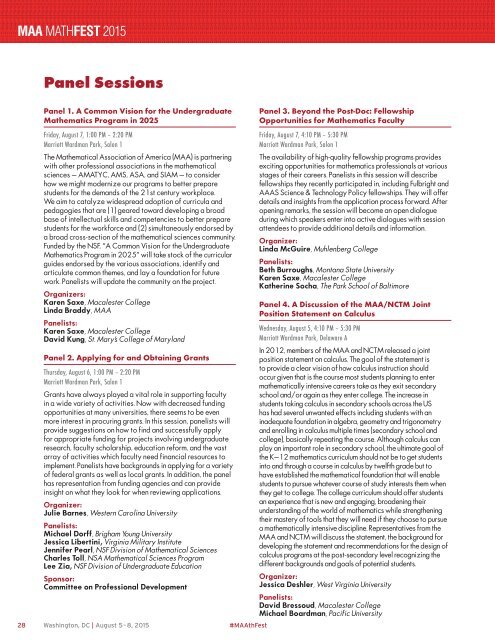calculus
1DdlCiZ
1DdlCiZ
- No tags were found...
You also want an ePaper? Increase the reach of your titles
YUMPU automatically turns print PDFs into web optimized ePapers that Google loves.
MAA MATHFEST 2015Panel SessionsPanel 1. A Common Vision for the UndergraduateMathematics Program in 2025Friday, August 7, 1:00 PM – 2:20 PMMarriott Wardman Park, Salon 1The Mathematical Association of America (MAA) is partneringwith other professional associations in the mathematicalsciences – AMATYC, AMS, ASA, and SIAM – to considerhow we might modernize our programs to better preparestudents for the demands of the 21st century workplace.We aim to catalyze widespread adoption of curricula andpedagogies that are (1) geared toward developing a broadbase of intellectual skills and competencies to better preparestudents for the workforce and (2) simultaneously endorsed bya broad cross-section of the mathematical sciences community.Funded by the NSF, “A Common Vision for the UndergraduateMathematics Program in 2025” will take stock of the curricularguides endorsed by the various associations, identify andarticulate common themes, and lay a foundation for futurework. Panelists will update the community on the project.Organizers:Karen Saxe, Macalester CollegeLinda Braddy, MAAPanelists:Karen Saxe, Macalester CollegeDavid Kung, St. Mary’s College of MarylandPanel 2. Applying for and Obtaining GrantsThursday, August 6, 1:00 PM – 2:20 PMMarriott Wardman Park, Salon 1Grants have always played a vital role in supporting facultyin a wide variety of activities. Now with decreased fundingopportunities at many universities, there seems to be evenmore interest in procuring grants. In this session, panelists willprovide suggestions on how to find and successfully applyfor appropriate funding for projects involving undergraduateresearch, faculty scholarship, education reform, and the vastarray of activities which faculty need financial resources toimplement. Panelists have backgrounds in applying for a varietyof federal grants as well as local grants. In addition, the panelhas representation from funding agencies and can provideinsight on what they look for when reviewing applications.Organizer:Julie Barnes, Western Carolina UniversityPanelists:Michael Dorff, Brigham Young UniversityJessica Libertini, Virginia Military InstituteJennifer Pearl, NSF Division of Mathematical SciencesCharles Toll, NSA Mathematical Sciences ProgramLee Zia, NSF Division of Undergraduate EducationSponsor:Committee on Professional Development28 Washington, DC | August 5–8, 2015 #MAAthFestPanel 3. Beyond the Post-Doc: FellowshipOpportunities for Mathematics FacultyFriday, August 7, 4:10 PM – 5:30 PMMarriott Wardman Park, Salon 1The availability of high-quality fellowship programs providesexciting opportunities for mathematics professionals at variousstages of their careers. Panelists in this session will describefellowships they recently participated in, including Fulbright andAAAS Science & Technology Policy fellowships. They will offerdetails and insights from the application process forward. Afteropening remarks, the session will become an open dialogueduring which speakers enter into active dialogues with sessionattendees to provide additional details and information.Organizer:Linda McGuire, Muhlenberg CollegePanelists:Beth Burroughs, Montana State UniversityKaren Saxe, Macalester CollegeKatherine Socha, The Park School of BaltimorePanel 4. A Discussion of the MAA/NCTM JointPosition Statement on CalculusWednesday, August 5, 4:10 PM – 5:30 PMMarriott Wardman Park, Delaware AIn 2012, members of the MAA and NCTM released a jointposition statement on <strong>calculus</strong>. The goal of the statement isto provide a clear vision of how <strong>calculus</strong> instruction shouldoccur given that is the course most students planning to entermathematically intensive careers take as they exit secondaryschool and/or again as they enter college. The increase instudents taking <strong>calculus</strong> in secondary schools across the UShas had several unwanted effects including students with aninadequate foundation in algebra, geometry and trigonometryand enrolling in <strong>calculus</strong> multiple times (secondary school andcollege), basically repeating the course. Although <strong>calculus</strong> canplay an important role in secondary school, the ultimate goal ofthe K–12 mathematics curriculum should not be to get studentsinto and through a course in <strong>calculus</strong> by twelfth grade but tohave established the mathematical foundation that will enablestudents to pursue whatever course of study interests them whenthey get to college. The college curriculum should offer studentsan experience that is new and engaging, broadening theirunderstanding of the world of mathematics while strengtheningtheir mastery of tools that they will need if they choose to pursuea mathematically intensive discipline. Representatives from theMAA and NCTM will discuss the statement, the background fordeveloping the statement and recommendations for the design of<strong>calculus</strong> programs at the post-secondary level recognizing thedifferent backgrounds and goals of potential students.Organizer:Jessica Deshler, West Virginia UniversityPanelists:David Bressoud, Macalester CollegeMichael Boardman, Pacific University


